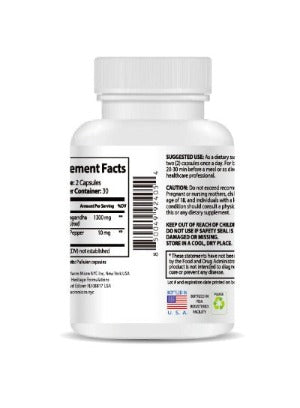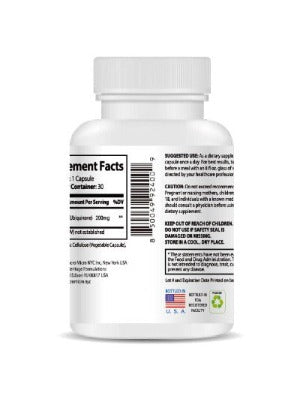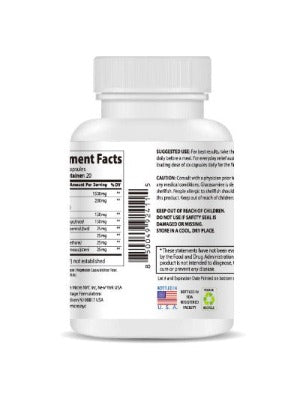If you struggle with the daily discomfort of dry, gritty, and tired eyes, you've likely tried a multitude of solutions. From artificial tears and warm compresses to blue-light-blocking glasses, we often treat these symptoms as a localized problem—an issue confined to the eyes themselves. But what if the irritation you feel is actually a message from deep within your body?
In the world of Traditional Chinese Medicine (TCM), the eyes are not seen as isolated organs. Instead, they are considered a "window" to your overall health, offering profound clues about the state of your internal systems. According to Dr. Jesse Huang, a third-generation TCM practitioner, the persistent discomfort of Dry Eye Syndrome is rarely just an eye problem. More often, it is a direct reflection of an imbalance in two of the most foundational organ systems in TCM: the Liver and the Kidneys.
This ancient perspective offers a revolutionary approach to finding relief. Instead of just temporarily moistening the surface of your eyes, TCM aims to "water the roots" by nourishing the internal organs that govern eye health. This guide, based on the wisdom of Dr. Huang, will explore the fascinating connection between your Liver, your Kidneys, and the health of your eyes, and provide practical, natural strategies to reverse dry eye from the inside out.
The Deep Connection: Why the Liver and Kidneys Govern Your Eyes
To understand how to heal your dry eyes, we must first appreciate the vital roles the Liver and Kidney systems play in maintaining their health, according to TCM theory.
The Liver: The Storehouse of Blood
In TCM, the Liver system is responsible for ensuring the smooth flow of Qi (vital energy) and storing the body's Blood. This isn't just the red fluid in your veins; "Blood" in TCM is a vital substance that nourishes, moistens, and provides the foundation for all mental and physical activity. There is a fundamental principle in TCM that states, "the Liver opens into the eyes" (肝開竅一步). This means that the health and function of the Liver are directly expressed through the eyes. When Liver Blood is abundant and flowing smoothly, the eyes are bright, vision is sharp, and the tissues are well-nourished and moist.
However, when Liver Blood is deficient, the eyes are the first to suffer. They lose their source of nourishment, leading to symptoms like dryness, eye fatigue, blurry vision, and floaters. A diagnosis of "Liver Yin Deficiency" is one of the most common root causes of Dry Eye Syndrome.
The Kidneys: The Foundation of Yin and Fluids
The Kidney system is considered the "root of life" in TCM. It stores our "Essence" (Jing), the congenital energy that determines our basic constitution and vitality. The Kidneys are also the source of all Yin fluids in the body. Yin represents the cooling, moistening, and nourishing aspects of our physiology.
When Kidney Yin is strong, the body is well-hydrated, and all our organs, including the eyes, are properly lubricated. A deficiency in Kidney Yin leads to systemic dryness, manifesting as dry eyes, dry skin, a dry throat, and night sweats. Since the Liver (which nourishes the eyes with Blood) relies on the Kidneys (which provide foundational Yin), a weakness in the Kidneys will inevitably impact the Liver, and by extension, the eyes.
What Depletes Our Liver and Kidney Health? Modern Life Culprits
If healthy Liver and Kidney systems are the key to comfortable eyes, what is causing them to become depleted in so many of us? Dr. Huang points to several key factors woven into the fabric of modern life.
-
The Natural Aging Process: TCM has long recognized that our vital energy changes as we age. Dr. Huang cites the ancient medical text, the
Huangdi Neijing, which observed that around age 40, our Yin energy begins a natural decline, and by 50, our sight may weaken. This is a direct result of the gradual depletion of Kidney Essence and Liver Blood over time.
Excessive Screen Time: The TCM principle "prolonged looking injures the blood" (久視傷血) has never been more relevant. The intense visual focus required to stare at digital screens for hours on end consumes a massive amount of Liver Blood that is meant to be nourishing your eyes, leading directly to a state of deficiency and dryness.
Hormonal Changes: Dr. Huang explains that from a TCM perspective, hormonal levels are a direct reflection of the state of Liver and Kidney essence and blood. For women, the decline in estrogen during menopause corresponds to a significant decrease in Yin and Blood. This is why women are particularly susceptible to Dry Eye Syndrome, as they are physiologically "rooted in yin and blood" (女子以陰血為本).
Lack of Restorative Sleep: Sleep is not just passive rest; it's a critical time for regeneration. Dr. Huang emphasizes that staying up late prevents the Blood from returning to the Liver to be cleansed and restored (血部歸肝). Consistently missing the crucial sleep window before 11 PM (子時之前) leads to a chronic deficiency of yin and blood, starving the eyes of the nourishment they need.
"Feed Your Eyes": A Practical Guide to Nourishing Your Liver and Kidneys
Understanding the root cause is the first step. The second is taking action. The beauty of the TCM approach is that it empowers you with simple, natural strategies to rebuild your internal resources and restore health to your eyes.
1. Eat and Drink for Moisture: Yin-Nourishing Foods and Teas
What you consume has a direct impact on your body's Yin and Blood.
-
Herbal Teas: Dr. Huang recommends several gentle yet powerful herbal teas to directly nourish the Liver and Kidneys.
-
Goji Berry and Chrysanthemum Tea (枸杞菊花茶): A classic formula to nourish Liver Yin and clear eye irritation.
Cassia Seed and Dendrobium Tea (決明子石斛茶): A potent combination to brighten vision and generate essential fluids.
Mulberry and Goji Berry Tea (桑椹枸杞茶): Excellent for building Blood and Yin, this tea is both delicious and deeply restorative.
Glehnia and Ophiopogon Tea (沙參麥冬): A duo specifically used to combat dryness throughout the body.
Nourishing Foods: Incorporate foods known in TCM to build Yin and Blood. Dr. Huang suggests ingredients like black sesame seeds and lily bulbs. Other excellent choices include dark leafy greens, beets, small amounts of high-quality meat, and dark berries like mulberries and blackberries. This dietary approach is complemented by Western nutritional advice to consume Omega-3 fatty acids and Vitamin A for eye health.
-
2. Adjust Your Lifestyle: Conserve Your Precious Resources
-
Prioritize Sleep: Make it a non-negotiable goal to be in bed before 11 PM. This single habit can have a profound impact on your Liver's ability to regenerate Blood.
Practice Mindful Screen Time: You don't have to quit your job, but you can change your habits. Implement the
20-20-20 rule: every 20 minutes, look at something 20 feet away for at least 20 seconds. This gives your eyes a much-needed break and helps conserve your Blood.
Avoid Draining Foods: Dr. Huang advises that people with dry eyes should reduce their intake of spicy foods, which can exacerbate dryness and irritation.
3. Support with Acupressure
While internal nourishment is key, you can support the process by improving circulation directly around the eyes. Dr. Huang recommends gently massaging four key acupressure points:
Jingming (inner corner of the eye), Zanzhu (inner eyebrow), Taiyang (temples), and Sibai (on the cheekbone below the pupil). This simple practice helps bring the nourishing Blood and Yin you are building internally directly to the eye tissues.
By shifting your focus from the surface of your eye to the health of your entire system, you can move beyond the cycle of temporary relief and begin a journey toward genuine, lasting comfort and clarity.
Your Questions Answered: A Q&A for Natural Eye Care
Q1: I have diabetes and also suffer from dry eyes. How does that connect to the Liver and Kidneys? A: In TCM, diabetes is often understood as a condition involving Yin deficiency. Dr. Huang advises that for diabetic patients with dry eyes, the primary strategy is to first get blood sugar under control. Concurrently, the treatment would focus on the same core principle: nourishing the Liver and Kidney Yin and Blood to restore the body's natural moistening functions and help repair the tear secretion process.
Q2: I'm pregnant and my eyes have become very dry. What is safe for me to do? A: It is essential to be cautious during pregnancy. Dr. Huang advises that any medication or potent herbs should only be used under a doctor's guidance. However, nourishing your body through diet is generally very safe and beneficial. He mentions that gentle, food-grade items like goji berries, dendrobium, and mulberries are excellent and safe choices to incorporate into your diet to help combat dryness.
Q3: Why does it seem like women, especially as they get older, suffer more from dry eyes? A: Dr. Huang's explanation aligns perfectly with TCM theory. Women are physiologically "rooted in yin and blood" (女子以陰血為本). Their entire menstrual cycle, as well as pregnancy and childbirth, relies heavily on these resources. The hormonal shifts of menopause represent a significant decline in this foundational Yin and Blood, which is why symptoms of dryness, including dry eyes, become so prevalent during this time.
Q4: How long does it realistically take to feel a difference when using these TCM methods? A: The timeline depends on the severity of your condition. For mild to moderate cases of dry eye, Dr. Huang suggests that patients can often feel noticeable relief within 2 to 4 weeks of consistent treatment. For more severe, chronic conditions, achieving a satisfactory and stable result may take several months. Success is also highly dependent on your commitment to the recommended lifestyle changes.
Q5: If I could only add one food or herb from this list to my diet, which one gives the most benefit for eye health? A: While all the recommended herbs are beneficial, the goji berry (枸杞) is arguably the most famous and versatile herb for eye health in TCM. It is mentioned multiple times by Dr. Huang. This is because it has a dual action: it nourishes both the Liver Blood and the Kidney Yin, addressing the two primary root causes of dry eye in one simple, slightly sweet berry. Adding a small handful to your daily tea, oatmeal, or soup is an easy and effective first step.









